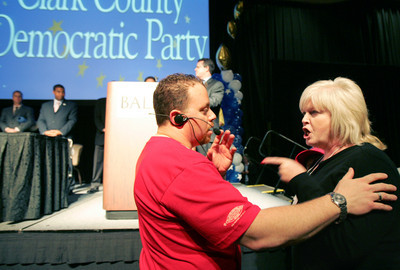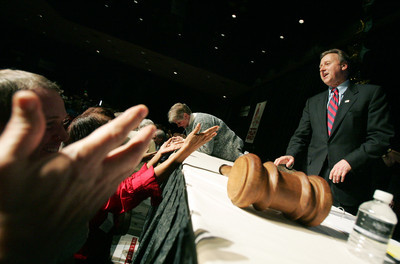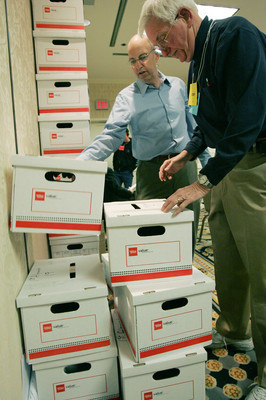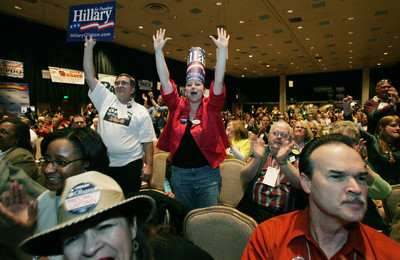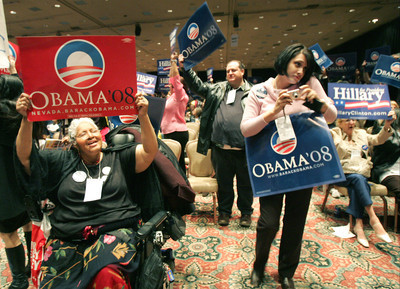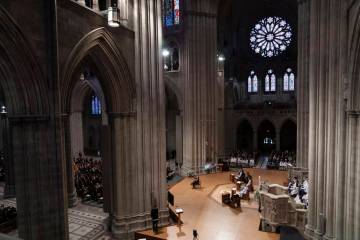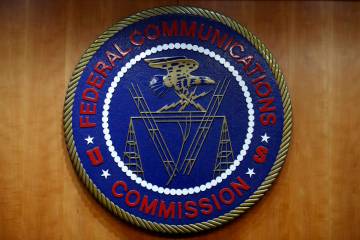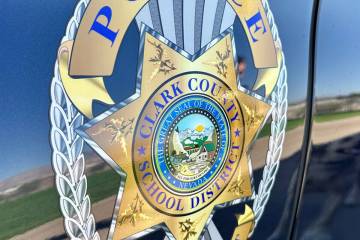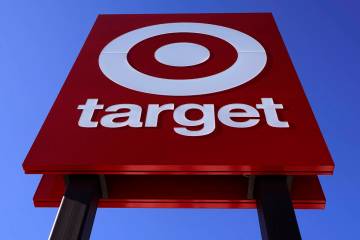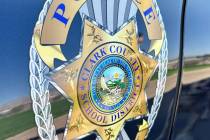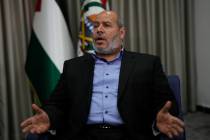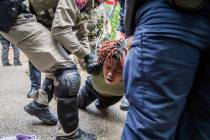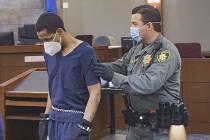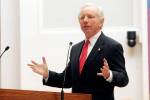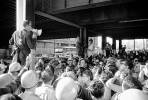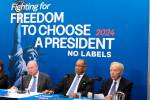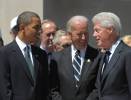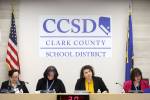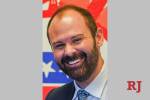Chaos delays Democratic vote
A disastrous Clark County Democratic convention Saturday resulted in no state delegates awarded to either Hillary Clinton or Barack Obama from the state's most populous county.
The two campaigns joined in demanding that the proceedings be called off after turnout overwhelmed the county party's capacities, even though it was not significantly more than party officials had said they were planning for.
The result was that no official party business got done and the whole process will have to be repeated, possibly as late as mid-April.
For several hours, party officials, led by Chairman John Hunt, tried to put a happy face on mass confusion, severe delays, thousands turned away and widespread anger.
Speeches went on as scheduled before a restive crowd as campaign leaders frantically negotiated behind the scenes, unbeknownst to their supporters on the floor, who were left mostly in the dark.
The convention's keynote speaker, humorist and Minnesota U.S. Senate candidate Al Franken, could sense the mood on the floor.
"I just want you to know that none of this is my fault," he said. "It's your fault for caring and for turning out and for having two great presidential candidates."
At 1 p.m., the campaigns first presented their proposed solution of adjourning the convention without a vote and reconvening at a date to be determined later.
Attendees of both camps were angry at the prospect of having spent a grueling Saturday for nothing.
The idea was voted down, and the convention went on. Two hours later, the campaigns asked to convene their supporters in separate rooms, where they both argued it would be unfair if the vote went on and pleaded for a "yea" vote.
At 4 p.m., the proposal was presented again and passed on a voice vote.
"They are just horribly unprepared and disorganized," delegate David Clapsaddle, 52, an Obama supporter, said of county party officials. "It's not a surprise there are this many people. They should have expected it."
Clapsaddle, a planning consultant in Las Vegas, said the aborted convention left him dissatisfied.
"People came here today to vote," he said. "I came today to elect delegates to the state convention, not to hear speeches."
Hunt said it was not the party's fault the convention didn't get completed.
"We were an hour away from completing this process," he said afterward. "This is not a situation where the convention was not in a position to issue results, because we were."
Given another hour, he said, the votes cast by delegates could have been counted and the empty delegate positions filled with alternates.
"That was ready to go," he said. "But the campaigns agreed that in order to have a more representative vote, they wanted to have a recess."
Sources who participated in the negotiations that led to the adjournment said both campaigns were vowing to challenge the results in court if the convention proceeded. The Democratic National Committee also was threatening sanctions.
Party leaders did, in fact, expect high turnout.
An e-mail sent to party members with information about the convention noted that more than 7,000 delegates had been allocated at the Jan. 19 precinct caucuses.
"We also welcome Democrats who want to attend as alternates or guests, so the final number of participants could exceed 8,000," the notice said.
Less than two weeks ago, Hunt and the convention chairman, Bill Stanley, told the Review-Journal that they wouldn't be surprised to see attendance exceed that number. They insisted that they were planning for every contingency, especially problems that might be created by high turnout, so as not to repeat the chaos that marred the precinct caucuses.
And yet, according to Bally's, the room the party reserved had a capacity of 5,000.
Resort officials estimated twice that many people attempted to attend. Lines had formed by 7 a.m.
Registration started at 8 a.m., and a line snaked all the way around the casino floor. Before 10 a.m., Bally's security barred more people from entering the convention arena, saying fire codes prohibited it.
"Obviously, the room was not big enough," Hunt acknowledged.
Asked why a bigger venue wasn't reserved when he himself had projected thousands more attendees than the room could hold, he said, "The (convention) committee thought, based on historical attendance, that it would be big enough."
He admitted that the party also didn't want to spend more money on a bigger location.
The only official party business done at the convention was to bring it to order, register delegates and alternates who now will have to be registered again, and adjourn it.
Among the business left undone was approving convention rules and voting on the platform.
Hunt said that means the later convention will be the same process all over again, just without the speeches. It will not likely be a simple in-and-out balloting, as the campaigns both told their supporters.
The convention redux is required to be held at least two weeks from now and at least 30 days before the state convention, scheduled for May 17 in Reno.
Throughout the day, Hunt insisted that the "problems of riches" were something to be happy about, because the record turnout signaled unprecedented enthusiasm for the Democratic Party. But most conventioneers were not pleased.
"This is the worst-run convention I've ever seen in my 40 years in the party," John Geremia, 58, bellowed from the aisle at one point.
Hunt's immediate predecessor as Clark County chair, Liz Foley, said many aspects of the process were poorly planned, and the small room was just the beginning.
Most importantly, the two rival campaigns should have been involved in the planning, preferably each contributing a co-chair to the convention, said Foley, an Obama supporter who said she voted for Hunt to succeed her.
"Instead, we had Bill Stanley, who is almost totally unknown, whose qualification as far as I can tell is that he's an old college friend of John Hunt, running the room," she said. "People didn't have confidence in the chair, and they didn't have confidence in the process."
Foley recalled 1984, the last time there was a divided convention. At the time, she was running Gary Hart's campaign in Nevada against eventual nominee Walter Mondale.
Rather than leaving delegate vacancies unfilled and trying to fill them on the fly at the convention, the two campaigns spent every night going through the paperwork from each precinct and filling all the slots, Foley said.
A Hart co-chair and a Mondale co-chair were elected at the convention, she said.
Foley said Hunt and the rest of the party leadership should take responsibility for Saturday's debacle rather than blaming the campaigns.
"When you have an aborted convention, which is very unusual in politics, that's not positive," she said. "The county convention is conducted by the county party and the leadership. They could have done a lot of things differently."
Both campaigns worked hard to get their supporters to the convention, wanting to make sure they held on to their winnings from Jan. 19.
That was the day that 117,000 Nevadans attended Democratic precinct caucuses. Clinton won the majority of precinct delegates statewide and in Clark County.
Those precinct delegates, however, then had to elect delegates at the county level to attend the state convention. That's what every county save Clark did on Saturday.
At the state convention, 25 delegates will be elected to the Democratic National Convention, to be held in Denver in August. Which candidate they're pledged to will depend on the vote of the state convention delegates, who are free to switch allegiances.
If the state delegates' vote reflects the Jan. 19 vote, Obama is likely to get one more national delegate than Clinton because of his strong finishes in rural and Northern Nevada.
Obama's edge in those areas was evident in returns from the other 16 counties on Saturday.
He won 512 of the 900 state delegates, 57 percent, to Clinton's 388, or 43 percent.
Clark County can elect up to 2,463 state convention delegates.
Just how eager both campaigns are to hang onto every possible delegate was clear from the effort they put into the failed convention.
When the Obama and Clinton camps divided into separate rooms Saturday afternoon, neither candidate had a clear edge in attendance.
Randy Soltero, a Clinton campaign leader in Nevada, was initially booed when he tried to persuade the attendees to vote to postpone the convention.
"Thousands of delegates today could not get in and left because of the delays," he said. "I've been in the registration room, and I'm telling you, a lot of those folks were Clinton supporters. That bothers me."
For the convention vote to be legitimate, he said, "We need each and every one of you, and those who were left out. Without it, we could lose. ... And I know nobody in this room wants to lose, not after everything we've invested in this campaign so far."
In the other room, Obama campaign leaders were making a similar case, saying the integrity of the results would be challenged and lead to further controversy if Saturday's convention continued.
"We don't want to have fewer votes in Denver for Barack Obama," said Democratic power consultant Billy Vassiliadis. "The process was not handled right. This is about our party."
D. Taylor, secretary-treasurer of the Culinary union, which backs Obama, criticized Hunt and the party for "incompetence."
Hunt called that accusation "absolutely incorrect."
"We had people ready to finish the convention," he said. "But both of the campaigns got together, and they made that decision" not to complete it.
As they walked out of the hall, 69-year-old Gene Miller and his wife, Marlene, both Clinton delegates, said they'd keep coming back as many times as they had to, to vote for her.
"If those had been women up there, we never would have had this problem," Gene Miller said. "That's why we need Hillary as president."
Contact reporter Molly Ball at mball @reviewjournal.com or (702) 387-2919.



